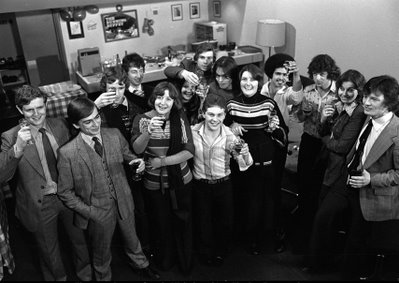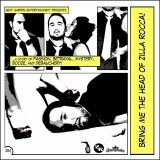The Up Series
 I’ve already been down to my mailbox twice today, hoping to see a sliver of red paper peeking through the slat. No luck thus far. I’m anxiously awaiting the arrival of 42 Up and 49 Up, the last two films of the still-in-progress Up Series. Since I started watching this seven-installment documentary last week, I’ve rearranged plans and liberally devoted blocks of hours to it. I’ve found myself considering the film’s fourteen participants and their trajectories the way most people consider friends. It’s made me reflect on myself and my uncertain future with the difficult, depressing questions usually reserved for New Year’s Eves or guidance counselor meetings. Seven Up! was released in 1964, intended as a one-off television feature. It documented the lives of a cross-section of fourteen seven-year-olds in England. It quizzed the kids about girlfriends and caught them at play, but the main motive was to interrogate two British obsessions: the class system and the educational system. It provided kids at the extremes, from a haughty trio of private school elitists already boasting of their Oxbridge futures to some sadder boys at a children’s home who ask in puzzlement, “What’s a u-u-university?” The filmmakers asked pointed questions about privilege and opportunities, with their underlying verdict being that the poorer children would go on to lead poorer lives. Paul from the children's home at age seven, explaining why he doesn't want to get married This film led to a follow-up, Seven Plus Seven, which tracked the children’s development at fourteen. From there, Michael Apted, the director of Seven Plus Seven and every subsequent movie, has made a sequel every seven years documenting his subjects’ progress. In each segment, he still focuses on issues of education and class, which sometimes does yield the results fitting his thesis. The richer kids do indeed often go onto higher education and higher incomes, while the poorer ones often live more simply as laborers. But as the films progress, that point starts to become more and more tangential to the true crux of their beauty: the cumulative successes and failures of lives being led. A child whose face is so lush with hope, who rattles on about reaching the moon, never makes it out of England. Others talk about falling in love, unaware that divorces or affairs wait down the line. We get the privilege of watching them age in seven-year increments, awaiting every update with the nervous anticipation of parents. Some grow into their looks steadily, a sloping forehead and aquiline nose suddenly now matching a widening set of cheekbones. Others age prematurely, already saddled with their own offspring by the third installment. But as the film’s repeated tagline, a Jesuit motto, suggests, “Give me a child until he is seven and I will give you the man,” the essence of their faces can always be traced back to their earlier, more innocent selves.  As they experience life, we follow right alongside them, rooting for victories, bracing for the realities. We compare them to each other and then eventually against the yardsticks of our own lives. As the fourteen children stumble toward adulthood, some transition more gracefully than others but no one is safe. Parents die and businesses fail. Love appears and love fades. In the most dramatic case, one of the kids, who becomes a homeless wanderer, sometimes appears to be losing his sanity. It’s all the starker to observe this accounting of setbacks only every seven years. And sometimes, as in a few cases, it may be even worse when little changes—when they’re still stuck at the same jobs at thirty-five that they had at twenty-one. It’s rare for me to be this affected by a movie, but the brunt truths of this series are hard to deny. It practically demands for you to examine your own path, to total your own wins and losses in seven-year columns and forecast yourself at the next septimal interval. Will I be fatter or balder or more wrinkled? Will I achieve that professional goal or finally buy a house or reconcile with my parents? It’s a gruesome task to perform and one subject, the patrician John, refers to his participation as “a little pill of poison” injected into his veins. But it’s only as exhilarating and as horrible as life itself, because the Up Series is life, a certain generation and segment of British life perhaps but also life in a much more universal sense, distilled. 49 Up was just released on DVD last month and filming for 56 Up should begin in 2012. Now that I’ve almost caught up, it seems an unbearably long time to wait for its continuation. But that’s a fact of life too, that this work is rich and painfully rewarding but ultimately still infallibly mortal. * MP3: "I Don't Wanna Grow Up" - Tom Waits from Bone Machine [Buy it] |





















Comments on "The Up Series"
-
 Anonymous said ... (5:09 PM) :
Anonymous said ... (5:09 PM) :
-
 Mr. Poncho said ... (11:19 AM) :
Mr. Poncho said ... (11:19 AM) :
post a commentI also watched all of them this year. I went to the library one day and they had the set up to 42, and within a couple of months 49 showed up at the theater. Really compelling viewing. I especially love the piling on of information, where eventually you get up to seven replies to the same questions. You'll love 42 and 49. Always fun to see their faces again.
yeah, it's brilliant stuff. One of the things that struck me, especially after watching the whole batch of them, was the way that the series gets to employ repetition, replaying the same snippet again and again, with the meaning slightly changing over the years as the characters grow. Most movies are too hemmed in by time constraints to be able circle back with such poetic refrains.
Oh, and that snippet of the "say, she serves greens, and, say, I don't like greens -- and I don't" is so heartbreakingly amazing. I was fond of walking around saying that after I saw the series.